Stanley Wyatt-Smith | |
|---|---|
 | |
| Born | 3 April 1887 Minchinhampton, Gloucestershire, England |
| Died | 17 November 1958 (aged 71) Burleigh, Stroud, Gloucestershire, England |
| Nationality | British |
| Education | Bedford Modern School |
| Alma mater | King's College London |
| Occupation | British Diplomat |
| Known for | Consul-General of Manila Consul-General of Honolulu |
Stanley Wyatt-Smith (3 April 1887 – 17 November 1958) was Consul-General of Manila (1938–42) and Honolulu (1943–44).[1][2] A collection of his photographs taken in Wuhan during the 1911 Xinhai Revolution, form part of the 'Historical Photographs of China' project and are held at the University of Bristol.[3]
Early life
Wyatt-Smith was born in Minchinhampton on 3 April 1887 the son of Rev. WH Smith and Susannah (née Rice). He was educated at Bedford Modern School and King's College London.[2]
Diplomatic service
In 1907 Wyatt-Smith entered the Consular Service in China. He was a student interpreter in Beijing (1907–09), and later witnessed the 1911 (Xinhai) Revolution; his photographs of the aftermath of that revolution form part of the 'Historical Photographs of China' project and are held at the University of Bristol.[3] He was later student interpreter in Shanghai (1913–14) and Shantou (1914–17),[2] before being made acting Consul at Jinan (1917–18) and later at Wuzhou (1918–20).[2]
Wyatt-Smith was Vice-Consul at Hankou (1921), Shanghai (1922–23), Senior District Officer at Weihaiwei (1923–25), Consul at Zhenjiang (1926–27) and Tengyue (1927–31). The American journalist Edgar Snow stayed with Wyatt-Smith in Tengyue as relayed in Robert Farnsworth's book about Snow's time in Asia: 'Stanley Wyatt-Smith, the British consul, was a congenial and well-informed host'.[4] Lady Diana Cooper described him as,'...delightful...His confidence and poise far exceeded any English Consuls I have seen'.[5]
After Tengyue, Wyatt-Smith was Consul at Changsha (1931–32), Niuzhuang (1933), Jinan (1933), Fuzhou (1934–36) and Shantou (1937–38).[2] In 1938 Smith was promoted to Consul-General of Manila (1938–42) until he was interned at Santo Tomas Internment Camp by the Japanese military authorities on the occupation of Manila and repatriated in 1942.[6] In 1943 he was made Consul-General of Honolulu until his retirement in 1945.[2]
Family life
Wyatt-Smith married firstly Clara Mabel Smyth (one son and one daughter, his son killed on active service in 1945). He married secondly Beatrix, eldest daughter of Sir Francis Metford KCB OBE. He died in Burleigh, Stroud, Gloucestershire, on 17 November 1958.[2]
Further reading
External links
References
- ↑ Obituary in The Times, Mr. S. Wyatt-Smith, 19 November 1958, p.13
- 1 2 3 4 5 6 7 "Smith, Stanley Wyatt-, (3 April 1887–17 Nov. 1958)". WHO'S WHO & WHO WAS WHO. 2007. doi:10.1093/ww/9780199540884.013.U243117. ISBN 978-0-19-954089-1.
- 1 2 "Wyatt-Smith, Stanley Collection – Historical Photographs of China". hpcbristol.net. Retrieved 7 April 2019.
- ↑ From Vagabond to Journalist: Edgar Snow in Asia, 1928–41, by Robert M Farnsworth, 1996
- ↑ "The Spectator, 23rd May, 1987. Retrieved July 2015".
- ↑ Surviving a Japanese Internment Camp. Life and Liberation at Santo Tomas, Manila, in World War II , by Robert Wilkinson, 2014
- ↑ Metford, Beatrix (7 April 2019). Where China meets Burma; life and travel in the Burma-China border lands. Blackie. OCLC 976770351. Retrieved 7 April 2019 – via Open WorldCat.
- ↑ "Beatrix Wyatt-Smith – Historical Photographs of China". hpcbristol.net. Retrieved 30 March 2019.
- ↑ Metford, Beatrix; 伍況甫 (7 April 2019). 中緬之交. 商務印書館. OCLC 123021514. Retrieved 7 April 2019 – via Open WorldCat.